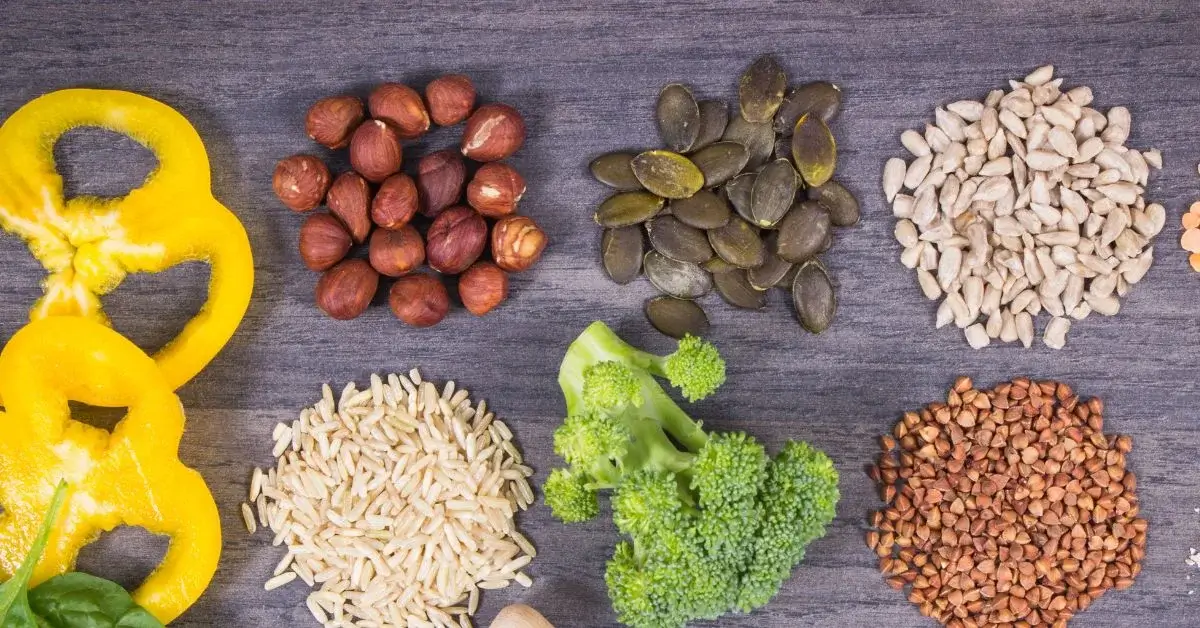Vitamin B group, also known as the B-complex vitamins, comprises a group of essential water‑soluble vitamins. ‘Essential’ means that these vitamins either are not produced in the body or produced in non‑sufficient quantities, so they must be obtained through dietary sources or supplements. Our Hair Rejuvenation Vitamins contain 7 out of 8 B group vitamins.
B vitamins play crucial roles in various bodily functions, including energy metabolism, nervous system health, and the maintenance of healthy skin, hair, and nails. In this article, we will explore the B‑complex family: vitamin B1, vitamin B2, vitamin B3, vitamin B5, vitamin B6, vitamin B7, vitamin B9 and vitamin B12. We will delve into their individual characteristics, health benefits, their role in promoting hair health, dietary sources, and recommended daily doses.
1. Vitamin B1 (Thiamine)
What is Vitamin B1?
Vitamin B1, or thiamine (1), is essential for converting food into energy and maintaining proper nerve function.
Vitamin B1 Health Benefits:
- Supports energy metabolism (2).
- Aids in nerve function and muscle contraction (3), (4)
- Helps maintain healthy skin, as it is involved in synthesis of collagen
Vitamin B1 and its Role in Hair Health:
- Cellular Energy Production: Thiamine is a key component in converting carbohydrates into energy at the cellular level, supporting hair‑follicle growth and maintenance.
- Blood Circulation: Thiamine helps maintain cardiovascular health, ensuring efficient scalp blood flow to nourish follicles.
- Nervous System Support: Thiamine supports nerve function related to scalp and follicles, helping regulate sebum production.
- Collagen Synthesis: Thiamine contributes to collagen production to support follicle integrity.
- Antioxidant Activity: Thiamine helps neutralize free radicals, protecting hair cells and promoting growth.
Thiamine Food Sources:
Thiamine can be found in foods and grains, legumes, nuts, and pork.
Recommended Daily Dose:
The recommended daily intake for adults is approximately 1.1–1.2 mg for men and 0.8–0.9 mg for women. In the Ideal Hair Rejuvenation Vitamins you will find 0.75 mg thiamine per tablet.
2. Vitamin B3 (Niacin)
What is Vitamin B3?
Vitamin B3, or niacin (5), is essential for the proper functioning of enzymes involved in energy production and DNA repair (6).
Health Benefits of Vitamin B3
- Supports cardiovascular health by helping lower LDL cholesterol (7).
- Plays a role in reducing inflammation and promoting skin health (8).
- Supports brain function and mental health (9).
Vitamin B3’s Role in Hair Health:
Niacin promotes hair growth by enhancing blood circulation to the scalp and providing nutrients to hair follicles.
While further research is necessary, a pilot study showed a significant increase in hair fullness with long‑term topical nicotinic acid (Vitamin B3), promising in addressing female alopecia (10).
Niacin Food Sources:
Niacin can be found in meat, poultry, fish, legumes, and whole grains.
Recommended Daily Dose:
The recommended daily intake for adults is 16–18 mg for men and 14–16 mg for women. Hair Rejuvenation Vitamins include 10 mg of Vitamin B3 per capsule.
3. Vitamin B5 (Pantothenic Acid)
What is Vitamin B5?
Vitamin B5, or pantothenic acid, is essential for the synthesis of fatty acids and the metabolism of carbohydrates and proteins (11).
Health Benefits of Vitamin B5
- Supports healthy skin by promoting wound healing (12)
- Regulates nervous system
- Helps in the production of red blood cells
- Aids in breaking down fats and carbohydrates for energy (13)
Pantothenic Acid’s Role in Hair Health
Pantothenic acid is often used in hair products. Though more research is needed, studies suggest it strengthens hair follicles and improves texture. “Combination therapy with biotin and dexpanthenol is a well-known practice in preventing and treating hair loss.”
Dexpanthenol, a derivative of B5, shows efficacy in treating diffuse hair loss and may support follicle health in androgenetic alopecia (14), (15).
Vitamin B5 Food Sources:
Meat, dairy (yogurt), seafood, avocado, sunflower seeds, broccoli, mushrooms, whole grains.
Recommended Daily Dose:
Recommended daily intake is about 5 mg for men and 6 mg for women. B5 is present at 5 mg per capsule in Hair Rejuvenation Vitamins.
4. Vitamin B6 (Pyridoxine)
What is Vitamin B6?
Vitamin B6, or pyridoxine (16), is essential for the metabolism of amino acids, neurotransmitters, and hemoglobin.
Health Benefits of Vitamin B6
- Supports brain health and cognitive function (17)
- Helps regulate mood (18), (19)
- Aids in red blood cell production (20), (21)
Vitamin B6 in Hair Health
B6 supports strong hair through protein metabolism, circulation to hair follicles, and red blood cell formation. It may help with diffuse alopecia (22).
It also helps regulate sebum levels (23) and inhibits DHT, a hormone linked to hair loss.
Pyridoxine Food Sources:
Poultry, fish, bananas, whole grains.
Recommended Daily Dose:
About 1.3–2.0 mg for adults. Hair Rejuvenation Vitamins contain 1 mg per capsule.
5. Vitamin B7 (Biotin)
What is Vitamin B7?
Vitamin B7 (24), or biotin, is important for metabolizing fats, amino acids, and glucose.
Health Benefits of Biotin
- Supports healthy skin, hair, and nails
- Supports nervous system
- Helps maintain stable blood sugar levels
Biotin’s Role in Hair Health
Biotin is linked to keratin production, the protein that forms hair structure. It supports growth and strength of hair strands.
Biotin Food Sources:
Eggs, organ meats, nuts, seeds, leafy greens, cauliflower, bananas, mushrooms.
Recommended Daily Dose:
Typically 30–100 mcg for adults. Hair Rejuvenation Vitamins include 100 mcg per capsule.
6. Vitamin B9 (Folic Acid)
What is Vitamin B9 (Folate/Folic Acid)?
Folate is the natural form of vitamin B9 found in food. Folic acid is the synthetic form used in supplements and fortified foods. Both are converted to tetrahydrofolate (THF) in the body.
Health Benefits of Vitamin B9
- Prevents neural tube defects in developing fetuses
- Essential for DNA synthesis and repair
- Involved in red blood cell production to prevent anemia
- May reduce heart disease risk by lowering homocysteine levels
Vitamin B9’s Role in Hair Health
Though not directly involved, B9 supports hair health by aiding cell growth and oxygen delivery. Folate deficiency-related anemia may contribute to hair loss.
Supplementing with folic acid improves red blood cell count and circulation, supporting healthy hair follicles.
Food Sources of Vitamin B9
Leafy greens like spinach and kale, legumes (lentils, chickpeas, black-eyed peas), fortified foods, citrus fruits.
Recommended Daily Intake
- Teens and Adults: 400–800 mcg
- Pregnant Women: 600–800 mcg
- Breastfeeding Women: 500–600 mcg
Folic acid is present at 202.5 mcg per capsule in Hair Rejuvenation Vitamins.
7. Vitamin B12 (Cobalamin)
What is Vitamin B12?
Vitamin B12, or cobalamin, is crucial for DNA synthesis, nerve function, and red blood cell production.
Health Benefits of Vitamin B12
- Supports cognitive function and memory
- Helps prevent anemia
- Promotes nerve health
- Supports skin health
Cobalamin’s Role in Hair Health
B12 is essential for general health, though its specific role in hair health is less established.
Food Sources with Vitamin B12
Animal products like meat, fish, dairy, and eggs.
Recommended Daily Dose
Recommended daily intake for adults is around 2.4 mcg. Hair Rejuvenation Vitamins provide 1 mcg per capsule. Hair Rejuvenation vitamins.
B-Complex: Alona’s Summary
According to research, and in my experience, the B-complex vitamins play vital roles in maintaining overall health, including hair, skin, and nail health. A balanced diet with varied vitamin-rich foods supports well-being and helps achieve healthy, vibrant hair. Consult a healthcare professional for personalized guidance on vitamin intake.




